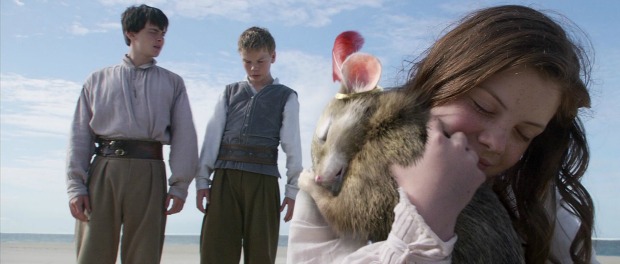The Chronicles of Narnia: The Voyage of the Dawn Treader
Narnia is the dorky Bible-basher at the back of the class whilst Harry Potter is the popular, apolitical kid who gets all the attention.
Plot summary
The Voyage of the Dawn Treader marks the return to Narnia for voyagers Edmund and Lucy Pevensie as they are swallowed into a painting and transported to the magical world. On their journey they connect with King Caspian and a noble mouse named Reepicheep for a mission that will determine the fate of Narnia itself.

The Narnia series has become a fantasy-adventure stalwart since The Lion the Witch and the Wardrobe was released in 2005, despite receiving an nth of the attention lavished on the similar fantasy-adventure Potter series. Kids love Narnia, and even the supposedly ‘disappointing’ Prince Caspian’s box office takings totalled $419 million. This was – rather bizarrely – perceived as a failure and so the Dawn Treader’s voyage onto our screens was fairly circuitous – Disney dropped it, Fox picked it up and cut the budget, and it wasn’t made 3D until after the filming wrapped.
Given this inauspicious start the result is a surprisingly good adventure, set in a picturesque world full of azure seas, misty gardens and golden cliffs. Edmund and Lucy Penvensie (Skandar Keynes and Georgie Henley) are given the task of aiding Prince Caspian (Ben Barnes) with finding seven swords and destroying the evil that dwells near the end of the world. Their quest involves manning the sea-lashed decks of a dragon-themed galleon, duelling a lot and slaying their inner enemies, greed and vanity. The siblings’ main hindrance is their officious cousin Eustace (precocious C4 School of Comedy actor Will Poulter), who is inadvertently sucked into the parallel world along with them, and devotes himself wholeheartedly to comedic whinging. His love-hate relationship with Reepicheep, the courtly side-kick mouse (voiced by Simon Pegg), gives the audience a little light relief from Lucy and Edmund’s wide-eyed earnestness.
Speaking of which, Henley and Keynes are earnest to the point of woodenness, and both suffer from tin ears when it comes to delivering lines. I found myself wondering if British child actors are just innately awkward onscreen, as recent cinematic offerings seem to imply. Luckily, the kids who watch this film won’t care about characters and good acting; they care about talking animals, other kids being revealed as secret royalty, and monsters getting thrashed. Ergo, Voyage of the Dawn Treader is everything a kid could want from a fantasy-adventure epic.
To describe the overall series comparatively, Narnia is the dorky Bible-basher at the back of the class whilst Harry Potter is the popular, apolitical kid who gets all the attention. His Dark Materials is, of course, the atheist drop-out brooding over a gun collection. It’s a shame that politics and religion conspired against the latter trilogy; I would have rather seen The Amber Spyglass than an allegory about Jesus. It would have been just as good – only it wouldn’t have contained lines like “We have nothing if we don’t have faith” and “You must believe!” and other such claptrap. Still, the children who’ll watch Voyage of the Dawn Treader will probably devote as much attention to this clunky subtext as they will to the poor acting, and very sensibly enjoy the pretty sets and talking animals instead.











COMMENTS